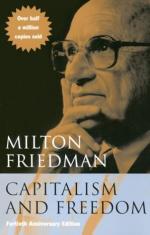|
This section contains 453 words (approx. 2 pages at 400 words per page) |

|
Chapter 7, Capitalism and Discrimination Summary and Analysis
Friedman claims that the rise of capitalism and the reduction in discrimination based on religion, race, social grouping and the like have gone together and he thinks there is a reason for this: contract arrangements replaced status as a source of wealth. A strong belief in private property rights led to Negroes always being permitted to own real or personal property; this belief in property rights made discrimination difficult because people's self-interest in benefiting from, say, the productivity of blacks, was pitted against their natural racism. Economic efficiency is separated from irrelevant characteristics.
Friedman is a racial egalitarian but he believes that coercive force should not be used against racists in violation of their property rights. For instance, fair employment commission legislation involves interference of individuals to enter into voluntary contracts. If a grocer wishes...
(read more from the Chapter 7, Capitalism and Discrimination Summary)
|
This section contains 453 words (approx. 2 pages at 400 words per page) |

|




